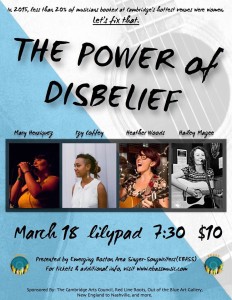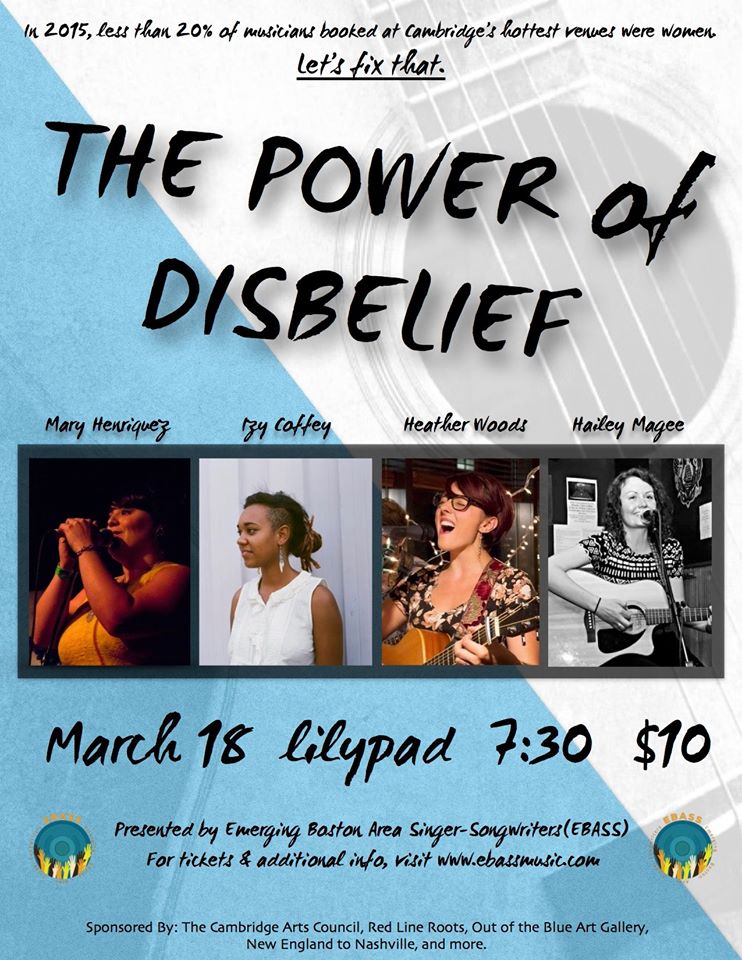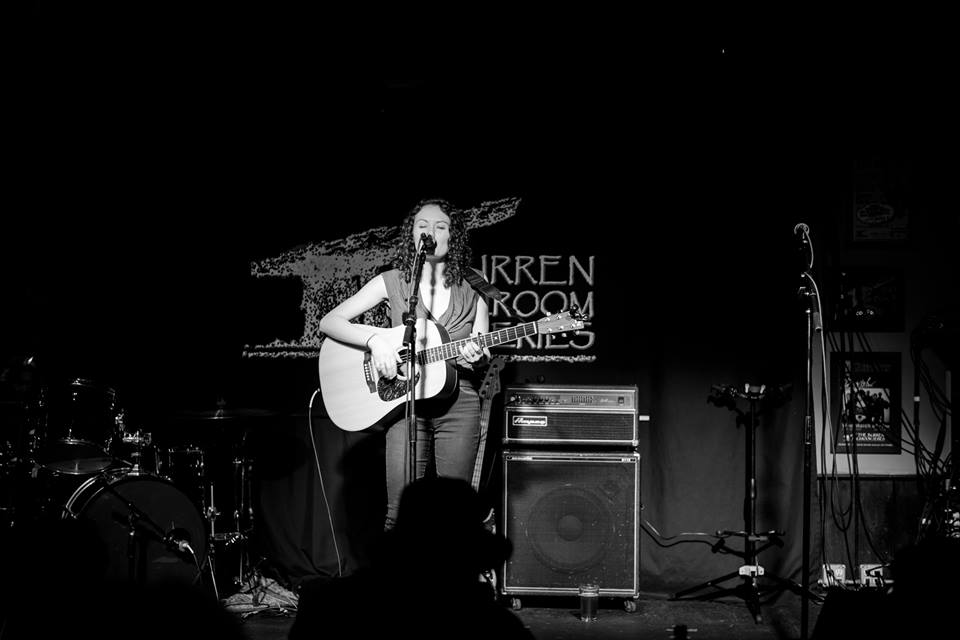An Honest (And Much Needed) Conversation About Equality: Interview With Hailey Magee
 Today is International Woman’s Day and in just 10 days a fantastic showing of some of the best female talent in town will take the stage at lilypad in Cambridge, MA to celebrate woman artists creating wonderful music and shine a well deserved light on the fact that we have such a pool of talent (no matter what the gender, sex, age, race, or otherwise) here in town and throughout New England.
Today is International Woman’s Day and in just 10 days a fantastic showing of some of the best female talent in town will take the stage at lilypad in Cambridge, MA to celebrate woman artists creating wonderful music and shine a well deserved light on the fact that we have such a pool of talent (no matter what the gender, sex, age, race, or otherwise) here in town and throughout New England.
I am a firm believer that a beautiful painting is a beautiful painting, a great song is a great song, and a talented artist is a talented artist. It is important that folks like Hailey Magee occasionally open my eyes to things like this though and I am made aware that certain disproportion does exist in the world and we need to shatter those circumstances in which they exist.
Boston is home to countless exceptional women artists. As musicians, bookers, and members of the Boston music community, we have the power to bring light to this inequality – and the power to challenge it.
On March 18th, join EBASS for a concert raising awareness about gender representation in the Boston music scene.
I caught up with Hailey to talk about the show and the mindboggling fact that looking back over the past year fewer than 20% of bills included women performers on them. Check it out below and get your tickets to that show on March 18th (performances from Mary Henriquez, Izy Coffey, Heather Woods, and Hailey Magee).
RLR: Let’s get the tough one out of the way right off the bat. Less than 20% of the shows in the city do not include female artists on their bill…being as forthright as possible, why do you think that is? EBASS seems to have a fairly balanced male to female ratio, I see loads of incredibly talented ladies at LLOMC, and in listing my top favorite acts to come out of Boston: Lula Wiles, Annie Lynch, Julie Rhodes all jump to the top of my list (without even for a moment thinking about gender as a factor)…so what gives???
HM: Great question! (To clarify the statistic: Of all performers, fewer than 20% were women. I got this statistic by compiling ALL of the performers at a venue on a given month from ALL bills and bands. Women composed 16.6% of that final number.)
The most important answer is that there is no SINGLE reason why women are underrepresented. I think a combination of many factors contributes to this disparity. But if I had to guess, here are my top three reasons.
- TOKENIZATION. When women make up less than ⅕ of all performers, they inevitably become the “token female artists.” I can’t tell you the number of times I’ve been told that I played pretty well, “for a girl.” Or the number of times I walk off the stage, only to have someone tell me how pretty I looked – not how good I sounded. Many women aren’t treated with the legitimacy that male artists are treated. This is discouraging, and cuts women out of the race from the start.
- DISCOMFORT. Most venues in town double as bars. For many women, bars aren’t comfortable because we expect to be hit on or sexually harassed. Unwanted touching. Constant come-ons. For many women, venues aren’t a space where we go to feel expressive and comfortable; they’re a place we feel on-guard. Being in the spotlight increases the chance that we’ll be approached unpleasantly. It’s wildly disempowering, to pour your soul out on stage and play a stellar set, only to come down and have someone tell you how great your ass looks in your dress.
- GATEKEEPERS. Think of all the venue owners, bookers, talent buyers, open mic hosts, and artist managers you know. How many of them are women? (Hint: Not a lot!) In order to get more women at every level of the music-making process, we need more women in gatekeeper positions – women who make the decisions about who plays when. The more women gatekeepers we have, the more women performers we’ll have on Boston stages.
RLR: Playing devil’s advocate: what is the solution here? Are you shooting for more all female bills, or a mix or what do you think the solution is to a very obvious tipping of the scales?
HM: I’m not shooting for all female bills. I’m shooting for bills that highlight performers of all genders, races, and backgrounds.
Ever hear of the role model effect? It’s the theory that, when you see someone who looks like you doing what you love – in politics, music, whatever – you are more likely to pursue that same path. The more role models that look like you, the more likely you are to follow your dreams and follow in their footsteps.
That’s why this bill is all women. We want to start the cycle of getting more women on stage so that emerging female artists can be inspired to follow their lead.
RLR: Here is a real toughy…who are some female performers you feel are really out there doing in the local scene that you think people should be paying attention to.
HM: Oh man oh man. (No pun intended!) In addition to the three amazing ladies performing at the March 18th show, my favorite local female artists are Jennifer Greer, Erin Jarvis, Natalie Renée of Stains of a Sunflower, and Kaiti Jones. Everyone should check these folks out.
RLR: What would you say to booking agents pulling together these bills? How might we remain more conscious of this imbalance?
HM: I got the idea for this show when I was booked for a seven artist bill as the only woman on the line-up. I politely declined participating in the show, citing poor gender representation as my reason. The booker was shocked and apologized profusely – – he hadn’t even realized that the line-up was so poorly balanced!
Most bookers don’t intend to be exclusive – they just aren’t always proactive about booking in a gender-representative way. The best way to ensure that you’re conscious of your show’s gender balance? Think Before You Book. It’s that simple.
As a booker myself, I understand that it can be challenging to put together a representative bill. Sometimes, I have to take the time to specifically reach out to women artists to craft my line-up. But changing the status quo demands work. Putting in the effort to create a diverse bill means that women artists see more role models and stage, audiences are more engaged with your line-up,and your venue will be known as a representative space for all musicians.
As artists, we can consider the gender balance of shows before agreeing to be on a bill. We can request that our bills be gender-representative, or when asked by bookers for artist recommendations, offer a gender-representative list. We can opt out of shows that have poor gender balance. The list goes on.


